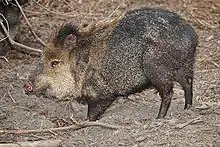javelina
English

The javelina
Alternative forms
- jabalina, javeli
Etymology
From Spanish javalina, jabalina, feminine form of jabalí (“wild boar”), from Andalusian Arabic جَبَلِي (jabalī) (in خِنْزِير جَبَلِيّ (ḵinzīr jabaliyy, “mountain pig”)[1]), from Arabic جَبَل (jabal, “mountain”). Cognate with Portuguese javalina, and similar in other Iberian languages.
Pronunciation
- (UK) IPA(key): /havəˈliːnə/
Noun
javelina (plural javelinas)
- (Canada, US) The peccary, especially the collared peccary. [from 19th c.]
- 1831, Benjamin Lundy, editor, The Genius of Universal Emancipation, page 117:
- The Javelina (Peccari) is an animal peculiar so far as I know to Spanish America.
- 1903 February, O. Henry [pseudonym; William Sydney Porter], “Hygeia at the Solito”, in Everybody’s Magazine, volume VIII, number 2, New York, N.Y.: John Wanamaker, →ISSN, page 174, column 2:
- Some well-mounted heads of deer and one of an enormous black javeli projected from the walls.
- 2013, Philipp Meyer, The Son, Simon & Schuster, published 2014, page 264:
- We […] were ready to send some prickly pears to the next world when the most unfortunate group of javelina on earth walked into view.
References
- The Arabic Contributions to the English Language: An Historical Dictionary, by Garland Hampton Cannon, Alan S. Kaye, p. 25
Catalan
Pronunciation
Further reading
- “javelina” in Diccionari de la llengua catalana, segona edició, Institut d’Estudis Catalans.
This article is issued from Wiktionary. The text is licensed under Creative Commons - Attribution - Sharealike. Additional terms may apply for the media files.